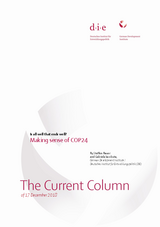The Current Column
Is all well that ends well?
Making sense of COP24
Bauer, Steffen / Gabriela IacobutaThe Current Column (2018)
Bonn: German Development Institute / Deutsches Institut für Entwicklungspolitik (DIE), (The Current Column of 17 December 2018)
It is done! The Katowice climate change conference (technically referred to as COP24) finally delivered the rulebook that will guide the implementation of the 2015 Paris Agreement. It has thus reached its single-most important objective. Indeed, the Paris Agreement would have been reduced to mere symbolism, had the 197 parties to the UN Framework Convention on Climate Change (UNFCCC) failed to agree on how to implement it. Adopting the rulebook was no mean feat. Its warrants a collective sigh of relief by all who care for effective global climate governance. All the same, the past two weeks saw multilateralism put to the test. While the test ended well overall, not all is well however. Some contentious issues have been pushed to future negotiations. These include new rules to govern carbon markets and international responses to loss and damage associated with climate change, which entail yet more questions about climate finance. Atmospheric repercussions of the Katowice proceedings, too, are likely to be felt well beyond COP24. The difficulties to hammer out the rulebook reflect an international climate that is less favourable to ambitious climate governance than in 2015. In spite of the prospect of unmanageable global warming, self-centered nationalism appears on the rise all over the world. The USA have touted to pull out of the Paris Agreement; Brazil withdrew its offer to host the next COP, reflecting recent political changes. Meanwhile, self-declared climate champions struggle with their homework. France saw its plan to introduce fossil fuel taxes brought to a halt by violent protests; in Germany, a “structural change commission” – mandated to broker the end of coal – postponed its conclusion to 2019 in the immediate run up to COP24. And a motley crew of major oil-exporting countries – the USA, Saudi Arabia, Russia and Kuwait – all but brought negotiations to a halt by stubbornly refusing to “welcome” the findings of the Intergovernmental Panel on Climate Change’s Special Report on 1.5°C of global warming as they resorted to ideological trenches that were meant to be overcome by the Paris Agreement. All this at a time when not only the IPCC elaborated very clearly, that every tenth of a degree of global warming matters significantly and that the window of opportunity for commensurate climate action is rapidly closing. The Global Commission on the Economy and Climate at the same time made a compelling case for the enormous growth opportunities and development co-benefits associated with phasing out coal and investing in climate-friendly technologies. The evidence presented by both the IPCC and the economic experts may yet gain traction as their dual messages of risk and opportunity are transpiring to a broader public and, indeed, electorates. In any case, COP24 delivered the required rulebook, thereby sending an unmistakable sign of life from one of the most salient multilateral processes. Many may claim credit for this demonstration of resolve. The Polish COP-President Michal Kurtyka joined forces with his predecessor Frank Bainimarama of Fiji by means of the Talanoa Dialogue, which concluded in an imploring Call for Action. The UN Secretary-General, Antonio Guterres, also exerted high-level leadership through recurrent personal interventions throughout the Katowice conference. The EU, Canada, New Zealand and a number of developing countries revived their High Ambition Coalition, proved and tested in Paris, to overcome negotiation deadlocks. Concomitantly, Germany’s and Norway’s announcements to double their respective pledges to the Green Climate Fund, a major source of climate finance for developing countries, also helped to nudge negotiations forward. Non-state and subnational climate action has also proved conducive. Their increasing significance has been recognised by the Yearbook of Global Climate Action, that was launched during COP24, and it substantiates narratives like that of a “New Climate Economy.” Some 400 investors that between them manage assets of US-$ 32 trillion committing themselves to divest from fossil energy is but one point in case. Not least, the US and China eventually worked together to develop a commonly acceptable methodology for the reporting of emissions and climate policies. Arguably, this was key to solving some of the most tenacious issues that had been standing in the rulebook’s way, the reporting of greenhouse gas reductions and the transparency of financial flows. After Katowice, the next major milestone to look for is the UN Climate Summit in New York in September 2019. It provides the world with a good outlook of which countries are ready to walk the talk before the next COP meets in Chile in November 2019. Indeed, the prospects of limiting dangerous climate change depend on what countries do or do not do at home rather than at conference halls. This also applies to Germany. While its announcement to double its contribution to the Green Climate Fund to EUR 1.5 billion by 2020 has been rightfully praised as a building block of success at COP24, the price tag for domestic inaction would soon prove much higher.



